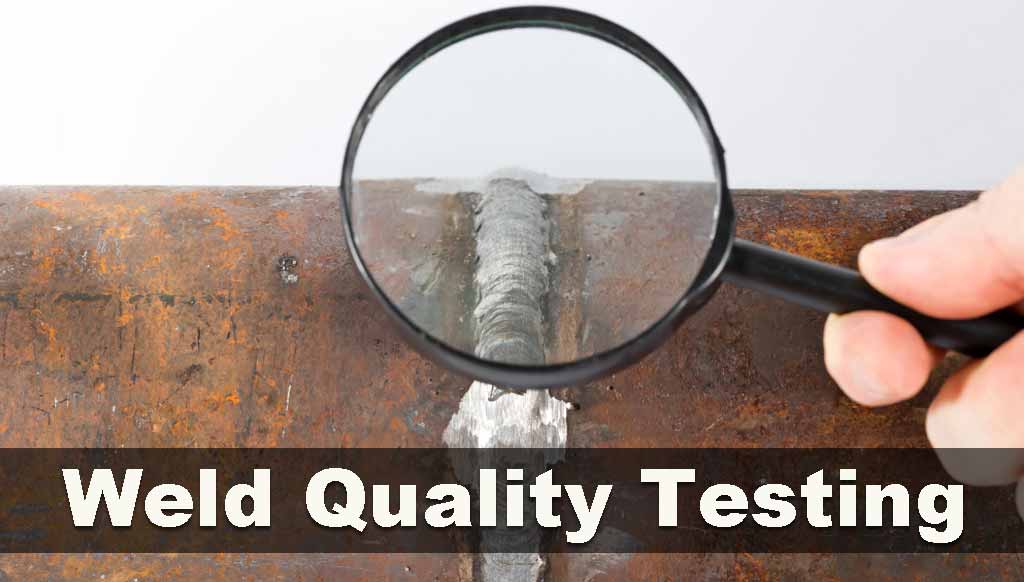The Influence of Extensive Welding Assessment on Market Criteria: Promoting Security, Integrity, and Compliance Across Different Sectors
The function of strenuous welding assessment is progressively recognized as an important part in enhancing sector requirements, where integrity, conformity, and safety take priority throughout varied industries. By ensuring conformity to established standards, such as those established forth by AWS and ISO, these inspections not only alleviate threats but additionally cultivate a sense of responsibility among experts. Nonetheless, as markets evolve and encounter new difficulties, the effects of these techniques may extend beyond mere conformity. What transformations might we anticipate in welding methods as the need for high quality and safety and security heightens?
Relevance of Welding Evaluations
Identifying the important duty of welding assessments in preserving top quality and security criteria, market specialists prioritize these examinations to make sure structural honesty. Welding evaluations function as an essential checkpoint in the construction procedure, determining flaws that could jeopardize the resilience and safety and security of bonded frameworks. By systematically examining welds, inspectors can identify issues such as insufficient infiltration, porosity, and splits, which may not be noticeable to the naked eye.
The relevance of these examinations expands beyond mere conformity; they are necessary for protecting lives and shielding financial investments. In crucial markets such as aerospace, building and construction, and production, a solitary faulty weld can bring about catastrophic failures, causing both economic loss and human casualties. Implementing rigorous evaluation protocols mitigates these dangers and boosts overall job integrity.
Furthermore, regular welding inspections cultivate a culture of high quality throughout companies, encouraging welders to stick to ideal practices and maintain high criteria in their job. This dedication to high quality not just improves operational performance but additionally strengthens the track record of business within their corresponding industries. Therefore, welding assessments are essential in promoting safety, integrity, and conformity throughout different markets.
Secret Market Criteria and Laws
The framework of welding evaluations is underpinned by a robust collection of market standards and policies that govern methods across different fields. Secret organizations, such as the American Welding Culture (AWS) and the International Organization for Standardization (ISO), develop standards that make certain quality and security in welding procedures. AWS D1.1 describes vital demands for welding steel structures, while ISO 3834 specifies quality demands for combination welding.
In enhancement to these certain criteria, industry guidelines like the American National Specification Institute (ANSI) and Occupational Safety and Wellness Management (OSHA) requireds additionally enhance compliance by setting safety and security procedures and operational ideal methods. These guidelines are important in sectors such as aerospace, construction, and manufacturing, where welding honesty is critical.
Additionally, sector-specific requirements, such as those from the American Society of Mechanical Engineers (ASME) for pressure vessels, supply extra layers of scrutiny to ensure that welds satisfy rigid security and performance standards. Adherence to these criteria not just promotes regulative compliance however also fosters a society of high quality and reliability across the welding sector, inevitably securing public welfare and enhancing functional effectiveness.

Benefits of Conformity and Dependability
Continually sticking to market read the full info here standards and guidelines in welding evaluations returns considerable benefits, enhancing general integrity and efficiency. The foremost benefit is the assurance of quality in bonded joints, which straight adds to the safety of structures and equipment. Conformity with look at here recognized requirements minimizes the threat of failure and catastrophic cases, consequently safeguarding both human life and beneficial possessions.
In addition, organizations that prioritize extensive welding examinations cultivate a culture of responsibility and professionalism and trust. This dedication not only bolsters the track record of the firm however also imparts self-confidence in stakeholders and customers concerning the integrity of product or services. Trusted welding processes cause lowered costs related to rework, repair work, and possible lawful liabilities originating from substandard craftsmanship.
Furthermore, keeping conformity with market requirements promotes smoother governing interactions, as organizations can readily demonstrate adherence to necessary procedures (Welding Inspection Gilbert Arizona). This aggressive strategy can bring about beneficial collaborations and opportunities within the industry, as well as access to new markets
Difficulties in Welding Examination
Navigating the intricacies of welding assessment presents a myriad of obstacles that can prevent conformity with industry requirements. The lack of standardized training for examiners can result in varied analyses of assessment criteria, which may endanger security and reliability.
One more difficulty hinges on the ease of access of innovative assessment tools - Welding Inspection Gilbert Arizona. While innovations such as ultrasonic screening and radiography can enhance discovery capabilities, their execution may be limited by price or schedule, particularly in smaller sized procedures. This disparity can bring about a reliance on much less efficient assessment methods, raising the risk of unnoticed imperfections
Furthermore, the fast-paced nature of contemporary production often pressures inspectors to prioritize speed over thoroughness, potentially ignoring critical flaws. Regulatory compliance can be intimidating due to the progressing nature of market requirements, leaving companies struggling to keep up with the latest requirements. These difficulties demand continual improvement in evaluation methods to guarantee the stability of welded structures across numerous sectors.
Future Trends in Welding Practices
Arising modern technologies and advancing methodologies are set to transform welding practices in the coming years. Developments in automation, such as robotic welding systems, are acquiring traction, enhancing accuracy and effectiveness while lessening human error. These systems will certainly not only quicken manufacturing however official site likewise help with constant quality assurance, attending to some of the challenges faced in manual welding.
Additionally, the assimilation of man-made knowledge (AI) and artificial intelligence into welding procedures is positioned to revolutionize inspection and monitoring. Real-time information analytics will make it possible for predictive maintenance, enabling proactive interventions that lower downtime and boost security. Enhanced fact (AR) and virtual truth (VIRTUAL REALITY) technologies are becoming important in training welders, giving immersive experiences that improve ability advancement without the risks linked with typical methods.
Sustainability is likewise a vital fad, as sectors seek greener techniques. The adoption of environment-friendly materials and techniques, together with energy-efficient equipment, will likely end up being typical. As industries adapt to these adjustments, the focus will certainly change toward greater compliance with security and environmental guidelines, ensuring that welding techniques not only fulfill existing standards yet also pave the method for a more secure and even more lasting future.

Conclusion
In verdict, extensive welding assessments significantly enhance sector criteria by making sure security, integrity, and conformity throughout different markets. As sectors proceed to focus on functional stability, the value of comprehensive evaluations will only raise, inevitably profiting companies and culture at large.
The duty of extensive welding evaluation is increasingly identified as an essential element in enhancing market standards, where safety and security, compliance, and integrity take precedence across diverse markets. Hence, welding inspections are essential in advertising safety and security, dependability, and conformity throughout different industries.
Secret establishments, such as the American Welding Society (AWS) and the International Company for Standardization (ISO), establish standards that make certain high quality and safety and security in welding operations. AWS D1.1 details important demands for welding steel frameworks, while ISO 3834 specifies top quality needs for fusion welding.
In final thought, extensive welding inspections considerably enhance industry standards by guaranteeing safety, integrity, and conformity throughout numerous markets.